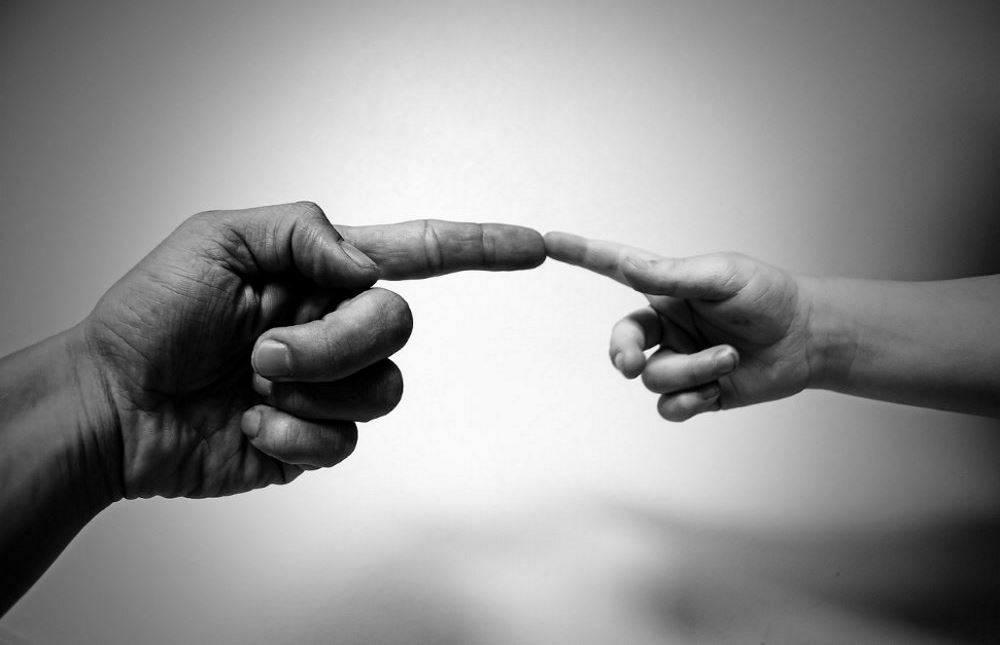Compassion Is Selfish And You Need It
Why Compassion Is Good For You
What Is Compassion?
Compassion is derived from the Latin words "com pati" meaning to suffer with.
It has been defined as an empathic understanding of a person's feelings, accompanied by
altruism, or a desire to act on that person's behalf.
In practical terms it is when you relate to someone’s situation, and you want to help them. You see someone having a hard time, and you show up beside them and offer a helping hand.
The Social Context Of Compassion
We are social creatures
We are social creatures and it has been said that we are the average of the five people we spend the most time with. We are susceptible to other people's emotions.
Social contagion
This has been referred to as emotional or social contagion and it has an evolutionary purpose. This is hardwired reflex is a basic building block of human interaction and comprises a range of critical survival skills such as the ability to coordinate and synchronize with others, to empathize with them, and read their minds.
Herd mentality
We are susceptible to herd mentality because we want to fit it in and be accepted, and so we follow the norm. We have a strong desire to conform.
Hardwired to conform
Recent research suggests that we are hardwired to conform.
This is not surprising given that we have the ingrained mentality of
our stone-age ancestors from the Savannah Plain 200,000 years ago, and
where conformity and "pack mentality" would have been another key survival skill.
In the business world, Daniel Goleman introduced the concept of primal leadership in organisations where he describes the leader's emotions as "... most contagious from the top down, from leader to followers."
Goleman and his team conducted research which showed that the leader’s style determines about 70% of the emotional climate in an organisation which in turns drives 20-30% of business performance.
Why Is Compassion Good For You?

There are strong moral and philosophical imperatives for compassion in most of the world's major religious belief systems, which boils down to it being "the right thing" to do.
There is an innate human response to other's suffering that can lead to a societal or even national outpouring of compassion such as we are witnessing at time of writing with regard to Ukrainian refugees.
For as long as it lasts, and until the news media cycle moves on, this can be seen as a good thing as largely selfish and materialistic western societies engage in these collective acts of compassion and reassert their democratic and humanitarian values.
According to Psychology Today there are some interesting personal benefits to be derived from the expression of compassion. Not only does the recipient benefit but so does the person who is giving compassion, and some of these benefits include:
-
Increasing feelings of social
connection
- A broadening ability to see a wider perspective outside of oneself
- A buffering effect against stress
- Increased perceptions of happiness
- An experience of pleasure
- An increase in longevity
- Reduced levels of cellular inflammation
Compassion Is Selfish And You Need It.
In my experience it is very easy to get caught up in my own problems and issues and to see the world very largely through the lens of my thoughts, my feelings and my experiences.
I have found that this is intensified when dealing with the attrition factor of long term and seemingly irresolvable problems.
In an earlier article I did share how that I have lived with certain issues for over 20 years and that from time to time cause me to feel overwhelmed and that I can see no light at the end of the tunnel.

But I also shared how that I have found that one of the most powerful ways to seeing some light at the end of my personal tunnel is to shift my focus away from myself and my situation and look for opportunities to show compassion and be the light to someone else.
I have found that I need this. It keeps me sane, it keeps me going and it gives me a sense of hope and my life a sense of meaning and purpose.
This idea is developed in Buddhist thought and teaching with the metaphor of "The Ferryman" who is someone who becomes "a champion of compassion".

The attitude of the Ferryman is that the pain that usually drags you down and causes you to withdraw into yourself is the stepping-stone for awakening your compassion and your understanding of the pain of others.
The Ferryman knows that we all cross the river of life together, that we are all in the same boat, we are all fundamentally the same and want the same things.
So, as the Ferryman you transmute the base metal of your own pain and suffering to bring hope and healing to others.
The purpose of this site is to show you how to cope in tough times, and to provide you with the tools to do this successfully by adopting a balanced approach to life.
We focus heavily on learning how to think effectively and how to not think - that is, to be mindful.
In my experience, the discipline and practice of compassion brings together the head and heart, and is an integral aspect of the balanced life.
Compassion is good for you and it is in your self interest!
Further Reading:
Demonizing The Other and Personal Acts Of Compassion
Next Article:
The Red Pill - This Is What Will Happen After You Take It
Return from "Compassion" to: Walking The Talk
LATEST ARTICLES
Master The Season You Are In - The Key to Fulfilling Your Purpose
 To fulfil your purpose, you must first master the season you are in. One of the biggest mistakes you can make in life is focusing all your energy on the next season instead of learning to master the s…
To fulfil your purpose, you must first master the season you are in. One of the biggest mistakes you can make in life is focusing all your energy on the next season instead of learning to master the s…The Inner Weight of Shame - Sustained By Attentional Fixation
 A Mind That Is Continuously Engaged In Self-Surveillance. Shame is one of the heaviest inner burdens a human being can carry. It does not announce itself loudly or demand attention through drama. Inst…
A Mind That Is Continuously Engaged In Self-Surveillance. Shame is one of the heaviest inner burdens a human being can carry. It does not announce itself loudly or demand attention through drama. Inst…Does Prayer Work? The Psychology of Prayer, Meditation and Outcomes
 Reality Is A Complex System Of Countless Interactions - Including Yours. So does prayer work? The problem is that the question itself is usually framed in a way that guarantees confusion. We tend to a…
Reality Is A Complex System Of Countless Interactions - Including Yours. So does prayer work? The problem is that the question itself is usually framed in a way that guarantees confusion. We tend to a…Living in Survival Mode Without Surrendering Mental Authority
Living in Survival Mode Without Surrendering Mental Authority
 Clear Thinking When You’re Just Trying to Stay Afloat. Many people today are overwhelmed because they are living in survival mode - not temporarily, but as a persistent condition of life. For many, th…
Clear Thinking When You’re Just Trying to Stay Afloat. Many people today are overwhelmed because they are living in survival mode - not temporarily, but as a persistent condition of life. For many, th…Manifestation Without Magic: A Practical Model
 Manifestation without magic is not a softer or more intellectual version of popular manifestation culture. It is a different model altogether. Popular manifestation teachings tend to frame reality as…
Manifestation without magic is not a softer or more intellectual version of popular manifestation culture. It is a different model altogether. Popular manifestation teachings tend to frame reality as…Staying Committed When You Can't See Progress - The Psychology of Grit
 Uncertainty Is Not The Absence Of Progress, Only The Absence Of Reassurance. One of the most destabilising experiences in modern life is not failure, but uncertainty and staying committed when you can…
Uncertainty Is Not The Absence Of Progress, Only The Absence Of Reassurance. One of the most destabilising experiences in modern life is not failure, but uncertainty and staying committed when you can…The Battle For Your Mind - How To Win Inner Freedom In A Digital Age Of Distraction
 From External Events to Inner Events. We often think of “events” as things that happen out there: the traffic jam, the rude comment, the delayed email reply. But what truly shapes our experience is wh…
From External Events to Inner Events. We often think of “events” as things that happen out there: the traffic jam, the rude comment, the delayed email reply. But what truly shapes our experience is wh…How to See Your Thoughts Without Becoming the Story
 A Practical Guide to Thought-Awareness. You can spend your life inside the stories of your mind without ever learning how to see your thoughts clearly and objectively. Most of the stuff we tell oursel…
A Practical Guide to Thought-Awareness. You can spend your life inside the stories of your mind without ever learning how to see your thoughts clearly and objectively. Most of the stuff we tell oursel…The Collison Decision Matrix - A Simple Framework for Better Choices
 The Collison Decision Matrix Is A Practical Everyday Thinking Tool. Most of us spend a surprising amount of time worrying about decisions. From small ones such as what to wear, what to eat, what to te…
The Collison Decision Matrix Is A Practical Everyday Thinking Tool. Most of us spend a surprising amount of time worrying about decisions. From small ones such as what to wear, what to eat, what to te…The Power Of Asking The Right Question
 The Power Of Asking The Right Question Lies In The Quest For Insight. To experience the power of asking the right question you must develop the practice of asking questions. The best way to improve th…
The Power Of Asking The Right Question Lies In The Quest For Insight. To experience the power of asking the right question you must develop the practice of asking questions. The best way to improve th…Site Pathways
 Here is a site pathway to help new readers of Zen-Tools navigate the material on this site. Each pathway is based around one of the many key themes covered on this site and contain a 150 word introduc…
Here is a site pathway to help new readers of Zen-Tools navigate the material on this site. Each pathway is based around one of the many key themes covered on this site and contain a 150 word introduc…
